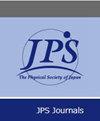Resistivity Measurements in Palladium Hydride Film Prepared by Low-Temperature Hydrogen Absorption Method
IF 2.2
4区 物理与天体物理
Q2 PHYSICS, MULTIDISCIPLINARY
引用次数: 0
Abstract
We investigated the superconducting properties of a palladium hydride (PdHx; x = H/Pd) film with a thickness of ∼100 nm prepared by a low-temperature hydrogen (H) absorption method. H atoms were loaded to a Pd film in H2 gas pressure of ∼0.25 MPa at temperatures of T = 180 and 150 K. At T = 180 K, after the resistivity variation due to H absorption was almost stopped, the PdHx film was cooled rapidly to low temperatures for the resistivity measurements. A superconducting transition was observed at Tc ∼ 1.1 K, where the transition width is smaller than 0.1 K. This indicates that a high-quality sample with a sharp transition can be obtained by providing sufficient time for H absorption. At T = 150 K, although the resistivity variation remained, the film was cooled. The transition temperature Tc increased to ∼2.1 K, whereas the transition width increased owing to the inhomogeneity of the H concentration in the film. Curiously, regardless of the H homogeneity, there remained a similar T-dependent residual resistivity in both films prepared at T = 180 and 150 K after the superconducting transition. This implies that the observed residual resistivity is essential for the future of the system, although its origin is not clear.低温氢吸收法制备的氢化钯薄膜的电阻率测量
我们研究了用低温氢(H)吸收法制备的厚度为 ∼100 nm 的氢化钯(PdHx;x = H/Pd)薄膜的超导特性。在温度为 T = 180 和 150 K 时,在氢气压力为 ∼ 0.25 MPa 的条件下将氢原子加载到钯薄膜上。在温度为 T = 180 K 时,当氢吸收引起的电阻率变化基本停止后,将 PdHx 薄膜迅速冷却到低温,以进行电阻率测量。在 Tc ∼ 1.1 K 处观察到超导转变,转变宽度小于 0.1 K。在 T = 150 K 时,虽然电阻率变化依然存在,但薄膜已经冷却。转变温度 Tc 上升到 ∼2.1 K,而由于薄膜中 H 浓度的不均匀性,转变宽度增加了。奇怪的是,无论 H 是否均匀,在 T = 180 和 150 K 时制备的两层薄膜在超导转变后仍存在类似的随 T 变化的残余电阻率。这意味着观察到的残余电阻率对系统的未来至关重要,尽管其起源尚不清楚。
本文章由计算机程序翻译,如有差异,请以英文原文为准。
求助全文
约1分钟内获得全文
求助全文
来源期刊
CiteScore
3.40
自引率
17.60%
发文量
325
审稿时长
3 months
期刊介绍:
The papers published in JPSJ should treat fundamental and novel problems of physics scientifically and logically, and contribute to the development in the understanding of physics. The concrete objects are listed below.
Subjects Covered
JPSJ covers all the fields of physics including (but not restricted to)
Elementary particles and fields
Nuclear physics
Atomic and Molecular Physics
Fluid Dynamics
Plasma physics
Physics of Condensed Matter
Metal, Superconductor, Semiconductor, Magnetic Materials, Dielectric Materials
Physics of Nanoscale Materials
Optics and Quantum Electronics
Physics of Complex Systems
Mathematical Physics
Chemical physics
Biophysics
Geophysics
Astrophysics.

 求助内容:
求助内容: 应助结果提醒方式:
应助结果提醒方式:


